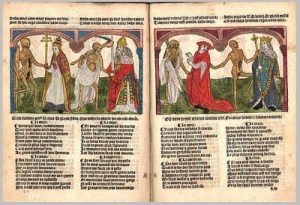I believe to understand where we want to go, we first need to remember where we have been. Because the article I wrote is long, I’m taking a page from Charles Dickens, and publishing it in 3 shorter installments.
Hopefully, I can write a decent cliffhanger at the end or each part to make you want to come back for more.
Incunabulum \In`cu*nab”u*lum\, n.; pl. Incunabula. [L. incunabula cradle, birthplace, origin. See 1st In-, and Cunabula.] A work of art or of human industry, of an early epoch; especially, a book printed before a. d. 1500.
What are economic paradigms and why are they important? Why is it important to know the one in which we live? How does it affect your choices for work and earning a living? How does it affect your life? How does it affect education and the way we are educated?
There have been three economic paradigms in recent history. They started when there was a break from things made on a small scale. They started when the things made and sold by artists, craftsmen, masters, blacksmiths, wheelwrights, family farmers, merchants of handmade goods, etc. were replaced by things that were mass produced and mass consumed.
The key point is that mass production is the cornerstone of all modern economic paradigms.First it was food that was mass produced. So the first economic paradigm was the Agricultural Economy.
For the first time in history, many people had enough to eat. They stopped worrying about food, did not farm their own crops nor raise and slaughter their own livestock. The mass production of food marks a turning point in history. It gave people something they never had as hunter-gatherers: free time. The ability to move about and travel, even live in new places. Leave the farms and come to what were becoming the first cities.
Owning land became the key to wealth, since land used to grow food was the key to the Agricultural Economy. Land Barons were born. The landed gentry was created. Kings gave land as the highest boon for services rendered. Kings were kings because they owned all the land which is why they could give some of it away.
Private property was born. My land was fenced off from your land. New nations opened up huge tracts of land because they knew that making that land productive was the key to prosperity. We managed muscles because farming was a hard, back-breaking job, even for the oxen and horses.
In the Agricultural Economy most people worked on a farm or in a trade (blacksmith, Tailor, Tinkerer). Almost everyone was illiterate. The first books were beginning to make their way into society. They were expensive books mostly for the rich gentleman and focused on either the how-to (such as “A Gentleman’s Guide to Fly Fishing”) or pornographic and erotic fiction.
Not many children were schooled. Among the poor the better-educated priests might teach some children to read and write – a little. Being able to sign your name instead of making your mark (“X”) was considered a big deal. As their fathers and grandfathers, boys still mainly went into the trades as a 7-year apprentice. Some Tradesmen could read and write but most laborers could not and had no formal education at all.
In many towns there were grammar schools where middle class boys were educated. They got their name because they taught Latin grammar. There are still many examples in England and even here in America. Boys worked long hours in the grammar schools and discipline was severe. There were also chantry schools for the middle-class. Some men left money in their wills to pay for a priest to chant prayers for their soul after their death. When he was not praying, the priest would educate local children. These schools became the precursor of the public schools that we know.
Upper class children were educated by tutors when they took their place as pages in an upper class household. The best – perhaps 15 -16 from each town – could go on to one of the two universities Oxford and Cambridge. There students learned the seven important (at that time) subjects: grammar, rhetoric (the art of public speaking), logic, astronomy, arithmetic, music and geometry. Afterward, you could go on to a business or a career in government with the help of “the old boys network”.
As for girls, in a rich family a tutor usually taught them at home. In a middle class family their mother might teach them. Upper class and middle class women were educated. However lower class girls were not. Later, during the 17th century, boarding schools for girls were founded in many towns. In them girls were still taught subjects like writing, music and needlework. It was considered more important for girls to learn ‘accomplishments’ than to study academic subjects.
“Public education” for the masses was not yet invented.
What came next completely transformed the world in ways that would make it as different from the previous economic paradigm, as the Agricultural Economy was different from the hunting and gathering societies from which it emerged.
Part Two: A Revolution that Managed Hands
